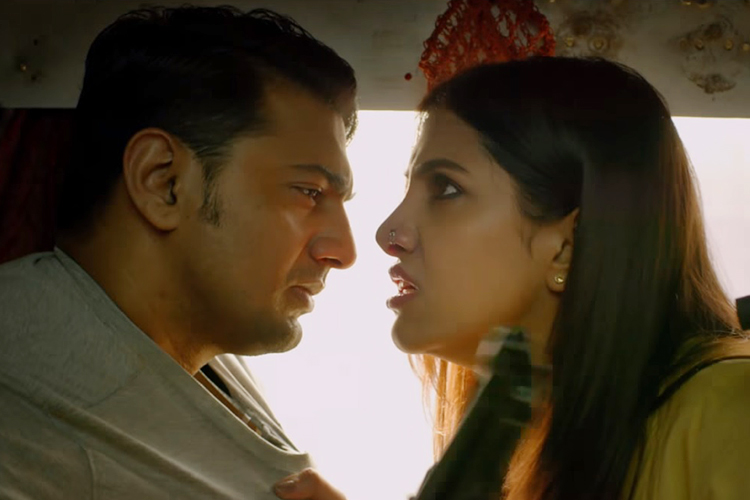Aniket Chattopadhyay is the right person for a subject as serious and as fragile as terrorism, which boils down to tremendous communal attacks by one community or another. With his solid background in journalism and his vast erudition, he is qualified for the research the subject demands. And though filmmaking is a different cup of tea altogether, to Aniket’s credit, Kabir is a film that demands equal attention to form and content, to styling and treatment and to characterizations and their interactions.
Ever since the silent era, audiences have thrilled to action set aboard locomotives: Whether it deals with spies evading Nazis, a bunch of teens trapped with a murderer, or a train full of passengers exposed to a deadly plague, if it happens on board a train, it is automatically twice as exciting. Kabir opens with the apparent chance meeting of Kabir, who introduces himself then as ‘Abir Chatterjee’ and the beautiful Yasmin, when the latter is trying to catch the Dooranto Express from VT to Kolkata on the very day when seven bomb blasts go off at different locations in Mumbai and her taxi refuses to go beyond Ballard Estate. The two meet again at VT station and one finds them in the same train compartment within the same coupe travelling to Kolkata. This is enough to trigger the suspicions of the audience about the true nature of these many coincidences. However, from this point on, the scenes within the train are mainly confined to the steadily raised voices of Kabir and Yasmin arguing, fighting and terrorising each other over, between the two of them, who is the kafir and who, the true jehadi.
Kabir manages to face the challenge of presenting the conflict between the jehadi and the kafir effectively to some extent. The twists and turns in the dialogue and action between the escalating conflict of identity and intrigue in Kabir on the one hand and Yasmin on the other, keep the narrative flowing and continuous. However, they lack the necessary zip as the story unfolds, layer by slow layer, till the true identities of Kabir on the one hand and Yasmin on the other, emerge to take the audience by surprise. The crackling chemistry that one expects from these two young people committed to their respective causes with fiery passion does not quite come through. This is also partly due to the fact that Dev and Rukmini are not mature enough actors to handle the roles they have been given.
Rather, it is the shuttling back and forth between different locales (different places in Kolkata where the terrorists are planning their next moves) that are the more interesting and well choreographed scenes enriched by the sparkling performances of the terrorists headed by Shataf Figar. The train scenes, in between, are enriched by the visuals and sounds of the moving train itself when the coach wheels make contact with rail joints (gaps with fish plates or welded connections), track points and so on add to the heightening suspense of the drama.
What Priyanka Sarkar is doing looking anxiously at screen monitors displaying gibberish and why she is confined to putting on her ear-phones to listen and make comments no one knows. Shataf and his two henchmen portrayed brilliantly by two theatre actors are the ones who actually keep our antenna up. The actor playing Imtiaz who has second thoughts about the unprovoked violence, and more importantly, on the very ideology that breeds terrorism leading to a series of pre-planned and diabolic bomb blasts that take the lives of innocent people, their faith of no consequence, brings out the dilemma with conviction.
Harendra Singh’s camera captures the locations of Mumbai’s Bhendi Bazar and other Muslim pockets as expressively and aesthetically as it does similar locations in Kolkata – the narrow lanes and bylanes, the bazaars, the crowds, the Victoria Memorial in the distance, the Howrah Bridge looming large in the backdrop, bring out the core of the two cities and so do the shots of different spots at Victoria Terminus. Indradeep Dasgupta’s music has rightly been kept secondary to the sound design which is more significant in a film that deals with terrorism and terrorists.
Finally, for all its niggling problems, kudos, nevertheless, to Dev, the producer, and Aniket for taking the risk of making a film stripped of romance, item songs, dream scene and rapid costume changes. That in itself is a minor achievement.
Bengali, Thriller, Color


